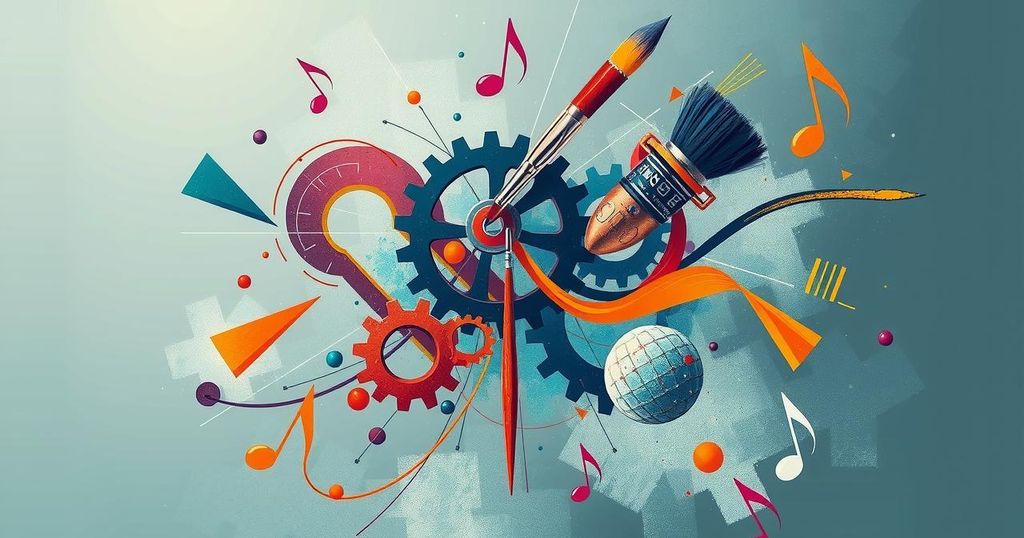AI Copyright Standoff Continues as House of Lords Deliberates
The debate over AI and copyright is reigniting as the House of Lords discusses the Data (Use and Access) Bill. Concerns grow about the fairness of allowing AI developers access to creative content without harming creators’ livelihoods. Critics, including prominent figures from the creative industry, raise alarms about potential losses as legislation issues remain unresolved. The clash continues with voices on both sides firmly entrenched, bringing economic implications into sharp focus.
The ongoing clash over artificial intelligence (AI) and copyright issues is heating up again as the House of Lords engages in contentious discussions. A significant divide has formed between ministers and peers advocating for artists’ rights, with neither side willing to budge. It’s intriguing, really—this argument revolves around jobs and creativity, crucial elements of our society. As one source from the peers’ camp put it, this situation is “unchartered territory.”
At the crux of this debate lies the challenge of balancing the demands between the tech sector and the creative industry. On one hand, AI developers argue for unrestricted access to content for training purposes; on the other, artists fear that their livelihoods are at risk. The Data (Use and Access) Bill has become the focal point of these discussions, but it’s struggling to make progress. It was expected to move through parliament seamlessly, yet it now finds itself in a frustrating limbo, bouncing back and forth between the House of Commons and the House of Lords.
This proposal stipulates that AI developers should have access to all content unless the individual owners opt out. However, nearly 300 members of the House of Lords don’t see eye to eye on this. They advocate for AI firms to disclose which copyrighted materials they use, arguing for more transparency and licensing agreements. Some, like Sir Nick Clegg, former Meta executive, support the bill and warn that requiring permissions could devastate the growing AI sector in the UK.
Among the critics is Baroness Beeban Kidron, a notable figure in the creative realm who warns against neglecting the rights of UK designers and artists. She calls for an amendment that would require a report on the bill’s impact on the creative industry after three months in force. Kidron fears that without protections, the current government risked “throwing artists under the bus.”
Moreover, it’s interesting to note that Technology Secretary Peter Kyle seems to have shifted his stance on UK copyright law. Once describing it as “very certain,” he now admits it’s “not fit for purpose.” This reflects a growing recognition that the current framework may not adequately address the challenges presented by rapidly evolving technology.
The Department for Science, Innovation and Technology is conducting broader consultations about these contentious issues. They’re not planning any amendments to the bill until they’re convinced those changes favor creators. If the ongoing debate continues without resolution, the bill could ultimately get shelved, though sources suggest that’s unlikely but still a possibility. And if it does end up shelved, several attached provisions would vanish too, including important regulations surrounding bereaved parents’ rights to access their children’s data, along with others aimed at streamlining NHS data sharing.
The root of this conflict stretches back to a time before AI became such a pervasive part of our lives. Initially, AI developers accessed a vast pool of online content—largely without payment—arguing it was all part of the public domain. The fallout from this has been significant, with household names like Sir Elton John and Dua Lipa expressing strong opposition. They see the appropriation of their works without consent as straightforward theft.
As controversy swirls, some point out that the work of artists like Sir Elton is now globally accessible. If UK regulations are too restrictive, AI companies might opt to source from elsewhere, potentially causing an economic drain. Overall, we find ourselves at a stalemate with no evident compromise in sight.
Amidst all this complexity, there remains no easy answer—a reflective pause seems necessary as the discourse continues. In the meantime, creatives and technologists will have to navigate the murky waters of copyright and innovation, whose waters are increasingly tangled.
The ongoing showdown between the creative industry and AI developers underscores a critical debate about copyright and the future of creativity. With both sides entrenched in their positions, the Data (Use and Access) Bill stalls in the legislative process, raising concerns about the welfare of artists in the age of AI. As the dialogues unfold, the stakes grow higher for both parties, representing larger implications for economic growth in the UK.
Original Source: www.bbc.com




